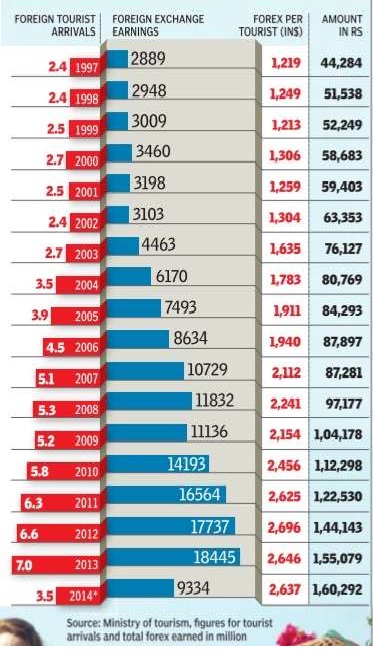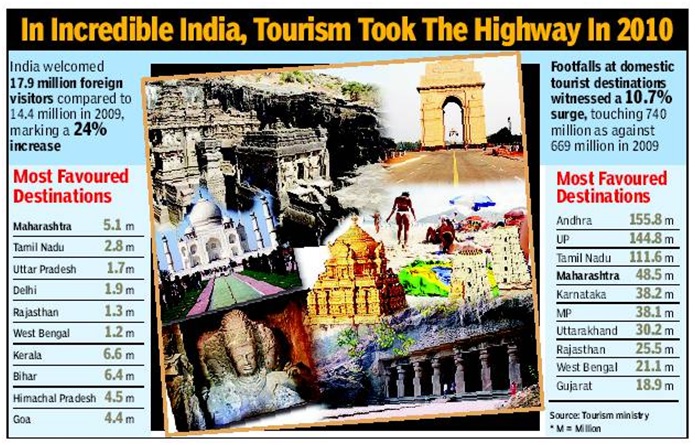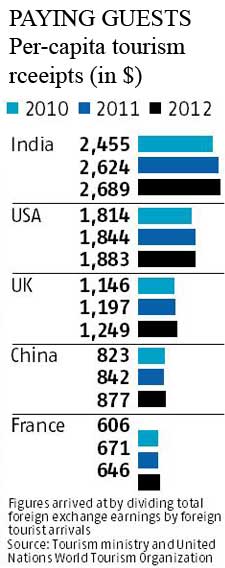Tourism: India (foreign tourists)
| Line 14: | Line 14: | ||
=1997-2014= | =1997-2014= | ||
| + | [[File: Tourism India 2010.jpg|Tourism, India: 2010; Graphic courtesy: The Times of India, July 21, 2011|frame|500px]] | ||
[http://epaperbeta.timesofindia.com//Article.aspx?eid=31808&articlexml=STATOISTICS-NOT-QUITE-BACKPACK-16012015011018 ''The Times of India''] Jan 16 2015 | [http://epaperbeta.timesofindia.com//Article.aspx?eid=31808&articlexml=STATOISTICS-NOT-QUITE-BACKPACK-16012015011018 ''The Times of India''] Jan 16 2015 | ||
Revision as of 02:33, 6 July 2015
This is a collection of articles archived for the excellence of their content. Readers will be able to edit existing articles and post new articles directly |
1997-2014
The Times of India Jan 16 2015
There has been a steady increase in the arrival of foreign tourists in India. In 2013, India was visited by 7 million foreigners, roughly three times the number in 1997. Over this period, foreign exchange earnings from tourism increased by more than six times. What the data shows is that in 1997, the average earning for India per foreign tourist was a little over Rs 44,000, which went up to Rs 1.5 lakh in 2013. Between January and June 2014, the latest period for which data is available, the figure was a tad higher still at about Rs 1.6 lakh per tourist.Studies suggest this might be linked to the relatively long periods for which foreigners stay in India.
Foreign tourists spend more per-capita and stay longer
India draws tourists with deep pockets
Ranks 41st in number of tourists received but 1st in per-capita spend by them
Ruchika Chitravanshi | New Delhi
business-standard February 17, 2014
India is not on top in numbers of foreign tourist arrivals but the average amount of money spent by international travellers here, on a per-capita basis, is more than anywhere else. Also, according to the United Nations World Tourism Organization (UNWTO) data, though the country is ranked 41st in terms of inbound tourist arrivals, it is 16th in total tourism receipts.
Major tourist destinations like the US, China, the United Kingdom and France see far higher annual foreign tourist arrivals, but their per-capita receipts from inbound foreign travellers is much lower than India. According to experts, this is mainly because of a large number of business visitors to India and longer duration of their stay.
Data from the tourism ministry and UNWTO show international tourists' per-capita spend in India as at the end of 2012 stood at over $2,600, while it was $1,900 in the US, $900 in China and $646 in France.
The difference in India's ratings for number of tourist arrivals and total receipts suggests that the country has been able to draw high-spending travellers. In 2013, it managed to earn $18 billion foreign exchange with only 6.8 million foreign tourists. Comparable 2013 figures for other countries are not yet available.
Other key tourist destinations like the US and China are ranked higher on both parameters. While the US was first in total receipts in 2012 ($126.2 billion), it was ranked second in the number of tourists visiting the country. China, which earned $50 billion from tourists in the year and was ranked fourth, stood third in annual foreign tourist arrivals. France, which received the highest number of foreign travellers (83 million in 2012), has been third in tourism receipts for the past three years.
The share of business travellers in inbound tourism has gone up from 15 per cent in 2009 to 23 per cent in 2012. Globally, during the year, 52 per cent of inbound tourists were for leisure and 14 per cent for business. In India, on the other hand, 27 per cent came for leisure, while 23 per cent travelled for business, according to tourism ministry data.
Besides, India also gets the advantage of being a longer-leisure destination. The average duration of stay for a foreign tourist in India is one week to a fortnight. Given a wide variety of tourist destinations the country offers, several European and American tourists stretch their stay even beyond a month. "We are not a country that a tourist just thinks of, packs a bag and lands. It is not an impulse spot; one needs to plan much in advance. This is why we are not a weekend destination like many of our neighbouring countries," says a spokesperson for Cox & Kings.
Over the past decade, India's rank in total earnings from foreign travellers has risen 20 notches - from 36 in 2000 to 16 in 2012. A depreciation in the value of the rupee has also made India an attractive option for foreign tourists. Besides, in spite of an economic slowdown, the rate of growth in tourist earnings has been higher than the global average. For instance, in 2012 when world tourism receipts grew by 3.2 per cent, India's earnings went up by seven per cent.
The country received the highest numbers tourists from the US, while Chinese nationals were the 12th-largest in terms of number of visitors.


